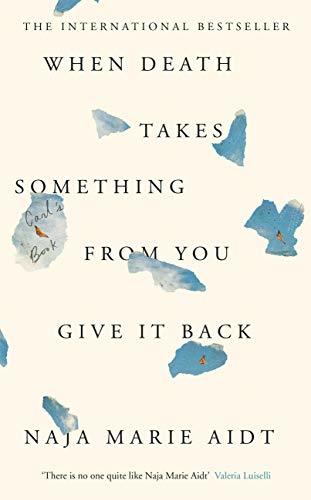What do you think?
Rate this book


"I raise my glass to my eldest son. His pregnant wife and daughter are sleeping above us. Outside, the March evening is cold and clear. 'To life!' I say as the glasses clink with a delicate and pleasing sound. My mother says something to the dog. Then the phone rings. We don't answer it. Who could be calling so late on a Saturday evening?"
In March 2015, Naja Marie Aidt's 25-year-old son, Carl, died in a tragic accident.
When Death Takes Something From You Give It Back is about losing a child. It is about formulating a vocabulary to express the deepest kind of pain. And it's about finding a way to write about a reality invaded by grief, lessened by loss.
Faced with the sudden emptiness of language, Naja finds solace in the anguish of Joan Didion, Nick Cave, C.S. Lewis, Mallarmé, Plato and other writers who have suffered the deadening impact of loss. Their torment suffuses with her own as Naja wrestles with words and contests their capacity to speak for the depths of her sorrow.
This palimpsest of mourning enables Naja to turn over the pathetic, precious transience of existence and articulates her greatest fear: to forget. The insistent compulsion to reconstruct the harrowing aftermath of Carl's death keeps him painfully present, while fragmented memories, journal entries and poetry inch her closer to piecing Carl's life together.
Intensely moving and quietly devastating, this is what is it to be a family, what it is to love and lose, and what it is to treasure life in spite of death's indomitable resolve.
126 pages, Kindle Edition
First published March 24, 2017
Maybe the truth about a person is kaleidoscopic. All the views together make up a prism, which is you.In March 2015, Aidt lost her 25-year-old son Carl; in a psychosis triggered by hallucinogenic mushrooms, Carl jumped from the 4th floor and died from his injuries. When Death Takes Something From You Give It Back (also dubbed "Carl's Book") captures the months following that devastating tragedy, as Aidt tried to understand the incomprehensible. It's about how she coped with the fact that a life can simply just stop. How the death of a loved one – and your own child at that – impacts your life in the most profound way: Aidt lost her sense of time and purpose, the award-winning Danish author could no longer write, the death of her son brought her to the limits of her own language. But it's also about how little moments can give us hope. How we find solace in friends and family, our memories, and even literature.
And I read the eye-witness accounts about how you ‘fell like an animal’, how you ‘came flying from the sky’, how you made a ‘high-pitched thwack’, how the witnesses saw the bones sticking out from your ankle, your hips, your knee. I read all about it and then once again, because I want to understand each and every detail about what has happened to you. I must know what happened to you. Of course I must know what happened to you. You are my child.I don't know what it feels like to be a mother, and that's another thing I appreciate about this book: it brings that experience, that very specific perspective of a mother, to the forefront. I like reading about motherhood (to a certain extent), and "Carl's Book" sheds light on an aspect of it that most of us don't even want to think about. And that's commendable.
Strength in sorrow, they say, but that’s a lie. Petrified, pure survival instinct, beside oneself, composed in a form of insanity, White, dead.The fragments in the book are written in different fonts, sometimes they are her son's notes, her own notes from Carl's childhood, or her pain-filled anger in capital letters. Aidt is surrounded by a whole chorus of mourners, all of whom have tried to turn grief into text.